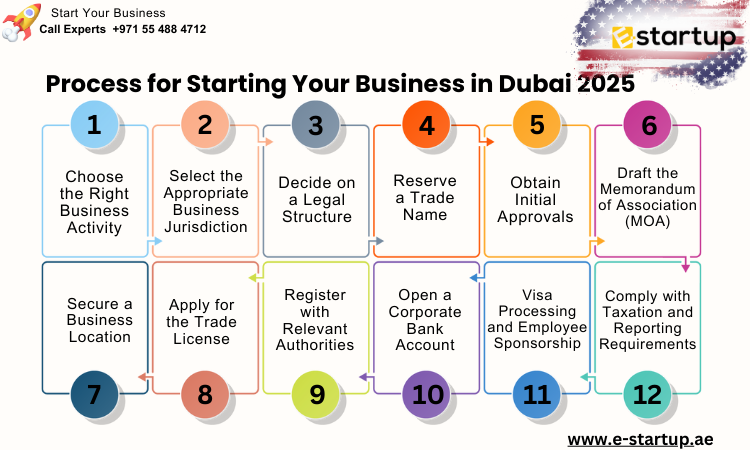Starting a business in Dubai, UAE, is a rewarding opportunity, thanks to the city’s strategic location, world-class infrastructure, and business-friendly policies. Here is a comprehensive, user-focused guide on how to navigate the process of setting up a business in Dubai.
1. Choose the Right Business Activity
Your business activity determines the licensing requirements and the type of setup. Options include:
- Trading: Import/export or retail.
- Professional Services: Consulting, IT services, or education.
- Manufacturing: Production or assembly.
- Freelancing: Creative services or remote consultancy.
Make sure the activity aligns with the Department of Economic Development (DED) approved list.
2. Select the Appropriate Business Jurisdiction
Dubai offers three main jurisdictions for business setups:
- Mainland: Ideal for companies requiring local market access; needs a local service agent or partner. Learn more at the DED Official Website.
- Free Zones: Suitable for 100% foreign ownership and tax benefits; ideal for export-oriented businesses. For example, a Dubai free zone business setup allows for complete foreign ownership and simplified procedures. Check details at Dubai Free Zones.
- Offshore: Focused on international trade; allows for 100% ownership but no physical office space. Visit the JAFZA Offshore page for more.
3. Decide on a Legal Structure
Your business structure impacts taxation, ownership, and liability. Common options include:
- Sole Proprietorship
- Limited Liability Company (LLC)
- Branch of a Foreign Company
- Free Zone Company
For those looking at low-cost options, consider low cost business setup in Dubai through certain free zones or shared facilities.
4. Reserve a Trade Name
Choose a unique and compliant trade name that reflects your business activity. Ensure it adheres to Dubai’s naming conventions:
- No offensive language.
- Avoid abbreviations of your name.
- Must be relevant to the type of business.
Submit your trade name application to the DED or relevant free zone authority.
5. Obtain Initial Approvals
Before proceeding further, secure initial approvals from the relevant authorities. These may include:
- DED Approval (for Mainland companies).
- Free Zone Authority Approval (for Free Zone setups).
- Additional Clearances: Certain activities, such as healthcare or financial services, may require approvals from specialized departments.
Refer to the DED Business Services for more information.
6. Draft the Memorandum of Association (MOA)
The MOA outlines the business’s scope, ownership structure, and operational guidelines. For Mainland businesses, this must be notarized by a UAE court. Visit Notary Public Dubai for guidance.
7. Secure a Business Location
Every business in Dubai must have a physical address. Options include:
- Renting an office space.
- Leasing a warehouse (for trading or manufacturing).
- Utilizing free zone flexi-desk services for startups.
Ensure the premises meet the legal requirements of your selected jurisdiction. For free zones, freezone business setup in Dubai provides affordable and flexible office solutions. Check details at Dubai Free Zones.
8. Apply for the Trade License
Submit the following documents to the relevant authority to obtain your trade license:
- Completed application form.
- MOA and Trade Name Certificate.
- Lease agreement or tenancy contract.
- Initial approvals.
This step is crucial for completing your Dubai company registration and starting operations. For more, visit the DED Licensing Section.
9. Register with Relevant Authorities
Depending on your business type, register with:
- Dubai Chamber of Commerce (for Mainland companies).
- Immigration and Labor Authorities (for hiring employees).
For certain sectors, you may also need to register with industry-specific bodies to complete your company registration in UAE. Refer to Dubai Chamber for more information.
10. Open a Corporate Bank Account
Choose a reputable bank in Dubai to open a business account. Prepare the following:
- Trade License.
- MOA.
- Passport copies of stakeholders.
- Proof of business activity.
For banking options, visit the Central Bank of UAE.
11. Visa Processing and Employee Sponsorship
If you or your employees need visas, apply through the General Directorate of Residency and Foreigners Affairs (GDRFA). Businesses can sponsor employees based on their license type. Learn more at GDRFA Dubai.
12. Comply with Taxation and Reporting Requirements
While Dubai offers tax advantages, some businesses may need to register for VAT or comply with international reporting standards. Keep up with:
- VAT Registration (if applicable) through the Federal Tax Authority.
- Corporate Tax (for specific sectors starting from 2023).
- Annual Audits (mandatory for free zone companies).
For businesses operating in specialized jurisdictions, such as free zone company setup in Dubai, ensure compliance with zone-specific regulations. Visit Dubai Free Zones for guidance.
Conclusion
Setting up a business in Dubai can be a streamlined and rewarding process when done correctly. By following these steps and seeking guidance when needed, you can establish a strong foundation for your business. For professional assistance, contact a licensed business setup consultant to ensure compliance and efficiency throughout the process.
Get expert guidance to make the registration process stress-free from E-Startup.
📞 Call us at: +1 307 274 3677
📅 Book your consultation here: Schedule Now














